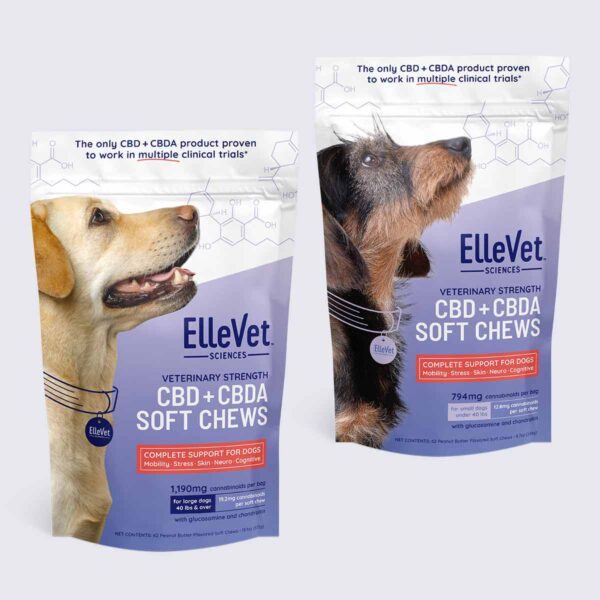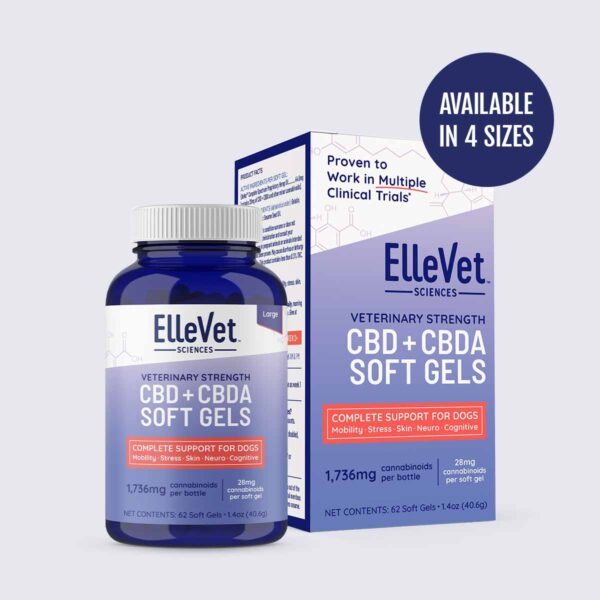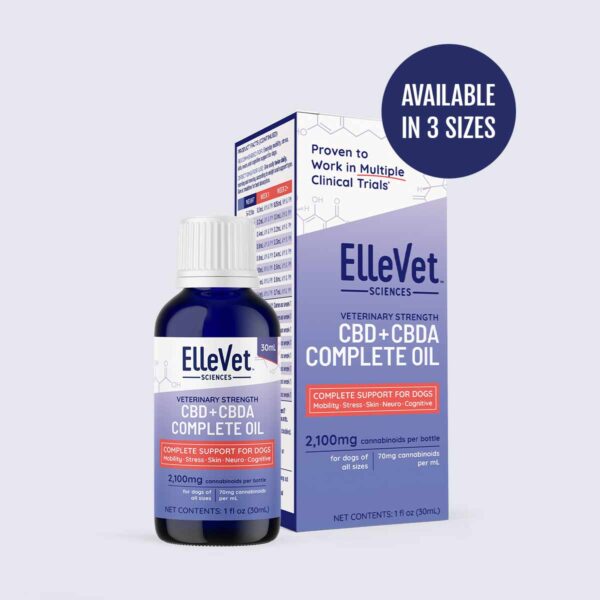Fish oil is a popular supplement, and humans have been implementing it into their diets for some time now. There are several different types of fish oil, and they come in many forms. It’s affordable and sits right next to the vitamins in the grocery store.
In recent years, fish oil has also been considered beneficial for dogs. Is there any proof of this? How does fish oil help our dogs, if at all? Your dog’s body and your body have a lot in common. If you’re enjoying the benefits of fish oil, here’s what you need to know about providing the same benefits to your dog.
What is Fish Oil?
Fish oil comes from the tissues of fish. It is rich in omega-3 fatty acids, which humans and most animals (including dogs) can’t produce enough of themselves. These omega-3 fatty acids (including eicosapentaenoic acid or EPA) can support healthy immune function, among many other benefits.
People and pets need these omega-3 fatty acids to stay healthy. They’re an essential part of our daily diets. Substantial omega-3 fatty acids can be difficult to achieve through a diet if your dog doesn’t eat pet foods with cold-water fish daily. That’s why fish oil supplements can be invaluable. They solve a crucial dietary need in the simplest way possible.
Fish oil isn’t always salmon oil and can come from many sources, including:
- Sardines
- Anchovies
- Mackerel
- Flaxseed (a non-fish omega 3 source)
What Are the Benefits and Applications of Fish Oil?
Supplements often promise a lot of benefits, but few really deliver. Fish oil is an exception as it isn’t an herbal remedy or an adaptogen. It’s a supplement that provides nutrients vital for human and dog health. If you or your dog don’t consume enough omega-3 fatty acids, this can lead to omega-3 deficiency. You need these fatty acids, and fish oil is a quick and efficient way to get them.
Some of the claimed health benefits of adding fish oil to your dog’s diet are:
- Supports heart health
- Maintains a healthy immune system
- Can reduce itching
- Can soothe flaky and itchy skin issues
- Promotes clean, shiny fur
- Soothes joint pain
- May support cognitive function
The benefits above are mostly from fish oil’s rich omega-3 fatty acid content. Many of these benefits have been studied and proven, and according to the American Kennel Club,
You can give your dog omega-3 fatty acids to ward off omega-3 deficiency. You can also give it to your dog to support their skin health, coat appearance, cognitive function, and overall brain health.
Before giving your dog fish oil supplements, you should consult your veterinarian. You don’t want to assume that the omega-3 fatty acids in fish oil are a catch-all solution.
If your dog has a severe skin condition, a condition that impairs their cognitive function, significant allergies, or joint health issues, your veterinarian needs to take a look. Fish oil can be part of the solution, but it may only be one step in a greater treatment plan designed to preserve and protect the health and comfort of your dog.
Fish Oil Safety and Storage
Fish oil has been found to be safe in dogs. There are no documented drug interactions or severe adverse reactions. If your dog is currently taking medications, it’s unlikely that fish oil will affect how they work. You should still ask your veterinarian before giving your dog fish oil if your dog is currently using medications or being treated for another condition.
Keep fish oil out of direct sunlight and refrigerated at all times. Fish oil usually comes in a darker tinted bottle, partly due to the negative effects sunlight can have on it (including rancidity). It is also important to properly seal the fish oil bottle after use.
When the oil comes in contact with oxygen for long periods, it can go ‘bad’ rather quickly. If you notice an especially unpleasant odor when you open the oil bottle, it is best just to throw it out rather than risk giving your dog spoiled oil.
Fish oil has a shelf life of about two years. If you give your dog fish oil daily, spring for a bigger bottle. Get a smaller bottle if you are doing a trial so that it doesn’t go bad before you’ve had a chance to use it up. Toss any remaining fish oil when the bottle hits its expiration date.
How Do I Give My Dog Fish Oil?
Fish oil and omega-3 supplements for people usually come in the form of a soft gel. Dogs don’t understand how to swallow soft gels, but they can be hidden well in a treat.
That’s why fish oil for pets usually comes in a bottle with a pump, similar to a hand soap dispenser. You can pump the fish oil directly on top of your dog’s bowl or pump it into a measuring spoon for better dosage accuracy.
The bottle will tell you how many teaspoons your dog needs according to body weight. Usually, small dogs only need a teaspoon, medium dogs need two teaspoons, and large dogs need three teaspoons.
Most dog parents find it easiest to mix the fish oil directly into their wet dog food. Most dogs enjoy the taste of fish oil and won’t fuss about eating it.
Are There Side Effects of Fish Oil?
Side effects of fish oil are rare, especially when in small amounts. If you abide by the serving sizes listed on the packaging and don’t feed an excessive amount of fish oil, it’s unlikely that your dog will experience any side effects.
The side effects of too much fish oil include:
- Nausea
- Diarrhea
- Vomiting
- Sleepiness
- Oily skin
- Fishy breath
If your dog is experiencing side effects of omega-3 fish oil, stop giving them fish oil. Fishy breath is the most common side effect. While it’s yucky, especially if your dog likes to lick you, it isn’t harmful.
Which Fish Oil Is Right for My Dog?
There are three different variations of fish oil on the market. It might not be immediately apparent which type of fish oil you’re looking at because the front label usually only says “fish oil.” The label on the back that shows the ingredients and nutritional information will tell you what type of fish oil is in the bottle.
These ingredients may include:
- Natural Triglyceride Oil
- Ethyl Triglyceride Oil
- Synthetic Triglyceride Oil
Natural Triglyceride Oil is a favorable option as it is the easiest to absorb. However, it is not filtered, so it may contain contaminants (although this is not common). If you’re worried about contaminants, only purchase fish oils from reputable brands that voluntarily test their products for purity and safety. Check out the company’s reputation online.
Ethyl Triglyceride Oil is distilled several times, making it a clean and concentrated option. Food-grade ethanol is a safe solvent to extract the essential fatty acids from the fish oil, leaving the remaining components behind. You know you’re only getting the omega-3s you need with ethyl triglyceride oil.
Synthetic Triglyceride Oil, also called ethyl ester fish oil, is thought to be the ‘lesser’ of the bunch, as it is artificial and is the most difficult for dogs to absorb. These fish oils are created using ethyl ester compounds with fish oil to develop alternative types of fats. Finding the best fish oil for dogs can be challenging, but if you pay attention to the label, you will be on the right track.
Are There Alternatives To Fish Oil for Dogs?
CBD can address issues that fish oil cannot support, but is often used in conjunction with CBD. CBD + CBDA won’t fix an omega-3 deficiency — fish oil is still your best bet if your vet has diagnosed your dog with an omega-3 deficiency.
However, ElleVet CBD + CBDA has been clinically proven to soothe Pruritus, or itching in dogs. It can also provide neuro support and promote overall joint health and joint mobility. CBD + CBDA can be a valuable part of a senior dog’s wellness plan.
Which Type of Fish Oil Should I Choose?
First, be sure that fish oil is a meaningful solution for your dog. There’s no sense in giving your dog fish oil if they’re getting all the omega-3 fatty acids they need through a well-balanced pet diet. You also need to be sure that there isn’t a serious underlying condition contributing to your dog’s symptoms. That’s where your veterinarian will prove invaluable.
All of these oil variations have the potential to help your dog; some are just more favorable than others in terms of absorption and concentration. Talk with your veterinarian about the different fish oil brands you are considering, so you can go through and choose the right one for your dog!
Sources:
Omega-3 Fatty Acids | Office of Dietary Supplements | National Institutes of Health
Fish Oil for Dogs | American Kennel Club
The Slippery Facts about Fish Oil | Review of Optometry












